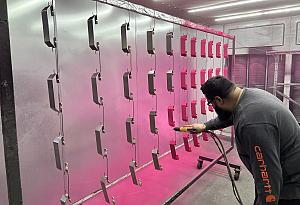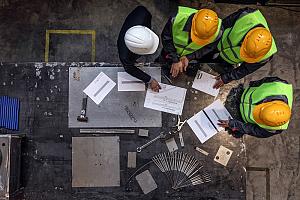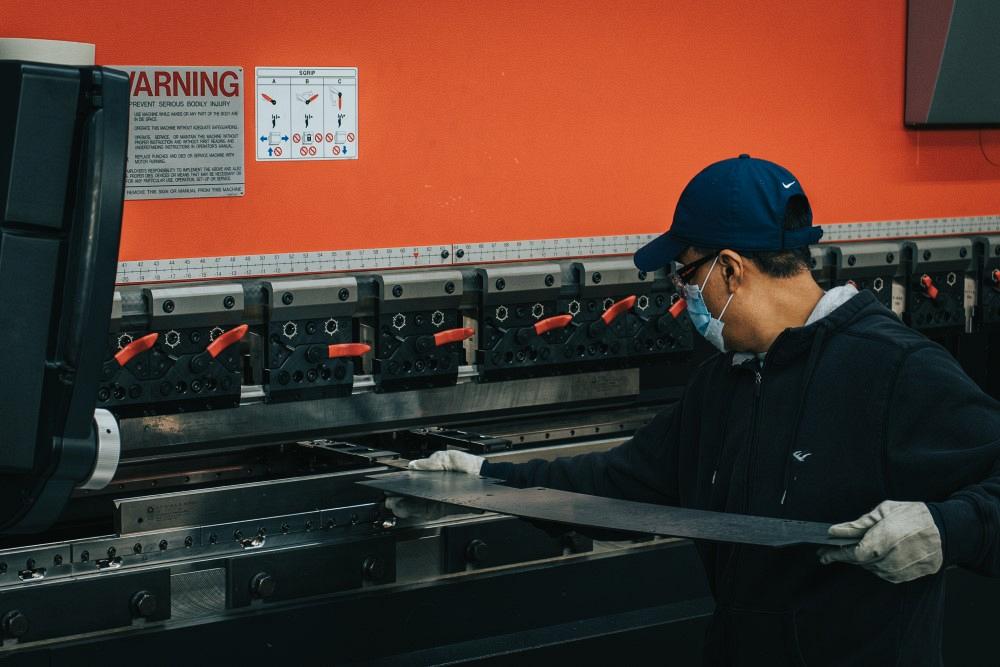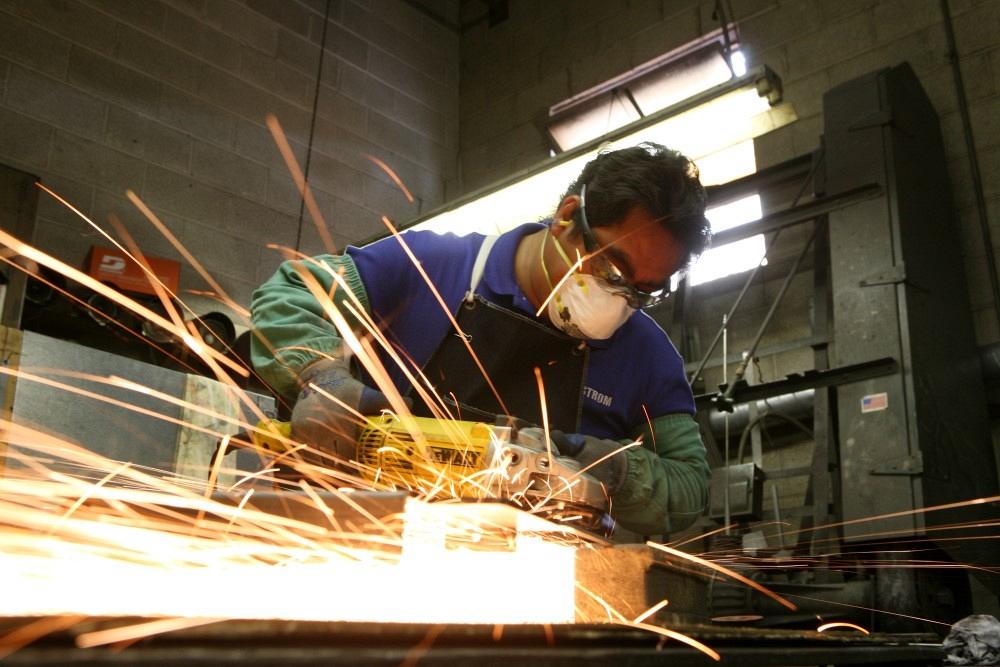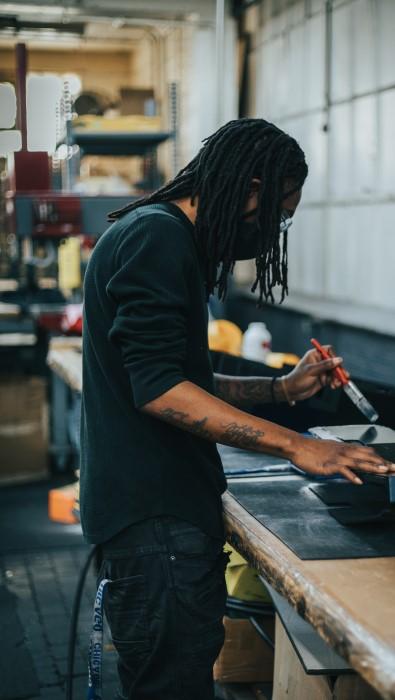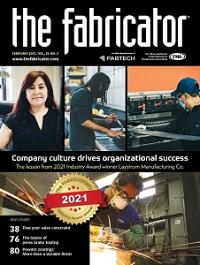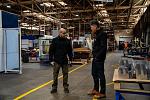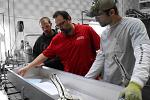Editor-in-Chief
- FMA
- The Fabricator
- FABTECH
- Canadian Metalworking
Categories
- Additive Manufacturing
- Aluminum Welding
- Arc Welding
- Assembly and Joining
- Automation and Robotics
- Bending and Forming
- Consumables
- Cutting and Weld Prep
- Electric Vehicles
- En Español
- Finishing
- Hydroforming
- Laser Cutting
- Laser Welding
- Machining
- Manufacturing Software
- Materials Handling
- Metals/Materials
- Oxyfuel Cutting
- Plasma Cutting
- Power Tools
- Punching and Other Holemaking
- Roll Forming
- Safety
- Sawing
- Shearing
- Shop Management
- Testing and Measuring
- Tube and Pipe Fabrication
- Tube and Pipe Production
- Waterjet Cutting
Industry Directory
Webcasts
Podcasts
FAB 40
Advertise
Subscribe
Account Login
Search
Culture comes first for precision metal fab shop Laystrom Manufacturing
The Chicago metal fabricator, The FABRICATOR’s Industry Award winner for 2021, finds that its internal “community” differentiates it from its competitors
- By Dan Davis
- Updated March 17, 2021
- February 8, 2021
- Article
- Shop Management
Laystrom Manufacturing Co. is in the middle of a Chicago neighborhood, just blocks from the city’s hipster hangout in Bucktown. While the location is unique when compared to hundreds of competitors in the metropolitan area and the Midwest, the inside of the Laystrom facility looks like almost any other precision metal fabrication shop. It has laser cutting machines, press brakes, and welding power sources. Raw sheet metal is delivered, and several days later finished metal parts and assemblies are shipped out.
Colin Cosgrove, Laystrom’s president, calls the company’s capabilities the “gladiator” stuff, a description he picked up from a business colleague. Fabricating technology is what every company in the manufacturing battle pit has when facing off in combat. In most instances, foes are very evenly matched.
The edge comes from what makes a company “unique,” Cosgrove said. That uniqueness in the way the company does business is driven by its purpose and core values, he added.
Cosgrove is a big believer in this, and it was important enough for him that when he came back to work for Laystrom after a two-year stint as sales manager for a machine shop in the suburbs, he stressed that the formulation of these guiding principles and a commitment to adhere to them was absolutely necessary if he were to assume the role of vice president of operations and business development. For the first four years of his return in 2014, Laystrom committed to safety in the workplace, increased collaboration with all employees, respect for all teammates, and working on continuous improvement. The foundation was being prepared for the next big step in trying to create the company culture that would go a long way in giving Laystrom the unique edge in the gladiatorial ring.
Two years ago Cosgrove wanted to get more people involved in the culture club. Talks of commitments to safety, collaboration, respect, and continuous improvement were fine, but they were really just placeholders. He wanted more employees to have input on the culture that they wanted to see and would enthusiastically support. Employees from all areas of the company were brought together in different groups and were challenged to identify and articulate core values over a 12-week period.
The group came up with character, connection, contribution, and cultivation as the core values. Character covers the positive attributes that Laystrom employees want to share with each other, business partners, and customers. Connection entails building stronger personal and business relationships, balancing work demands with that of family obligations. Contribution is every action taken to meet organizational goals. Cultivation is the fostering of knowledge sharing that helps individuals to grow and, in turn, Laystrom as well. (Cultivation was named by the company’s maintenance supervisor, who knows a thing or two about keeping operations running.) Cosgrove said that safety also was added because everyone should have the basic right to leave work in the same shape in which they arrive at work every day.
In addition, management crafted a purpose statement: “To give our people the opportunity to enjoy fulfilling careers, using technical skill, creativity, and a culture of caring to deliver profitable value to all our stakeholders.” It covered the core audience, the Laystrom team, and touched upon the key attributes that would help to deliver on that promise of fulfilling careers. Of course, the creation of the “profitable value” is the expected outcome.
Two years later has the company culture been able to sell time on the new 6-kW Amada fiber laser cutting machine, which was installed in late 2019? Cosgrove is pretty confident that, indeed, these core values played a big part in not just a few jobs here and there, but in much of the growth the company has had over the past two years. (Laystrom grew its sales revenues by 10% over the past year and 60% over the past three years. He did not want to disclose annual sales figures, but said the company had revenues in excess of $10 million. Today Laystrom employs about 72 people.)
The metal fabricator actually took time several years ago to analyze new business it won over the previous 18 months, from new and existing customers, and found that several characteristics helped them to win the work: speed, ability to scale, and design for manufacturability expertise.
“What it came down to is that we felt like we identified those characteristics where the market said that we were doing something right,” Cosgrove said. In turn, the company culture helped to support and foster those characteristics that made Laystrom stand out from competing fab shops with the same lasers and press brakes.
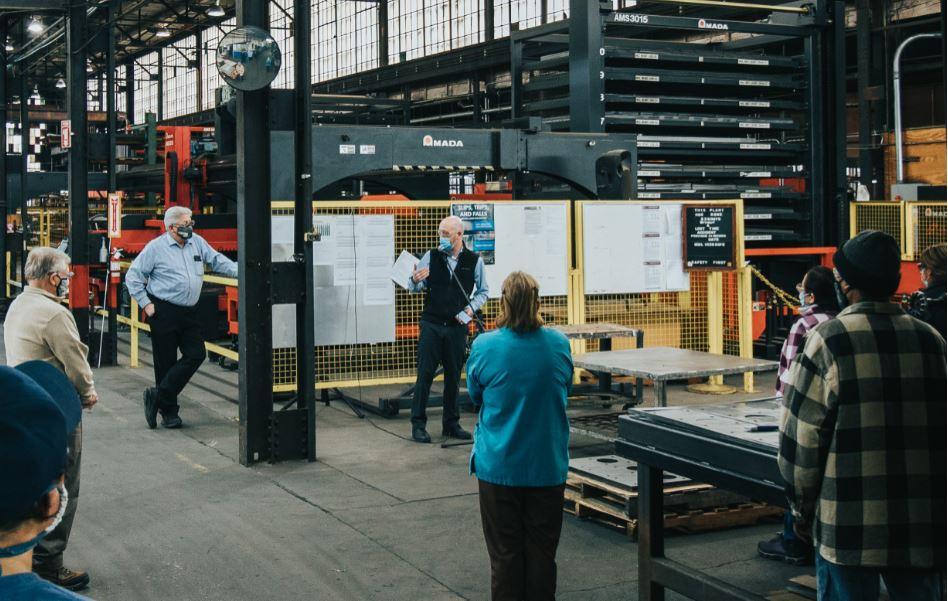
Colin Cosgrove, Laystrom Manufacturing’s president, responds to questions at a socially distanced morning huddle. Images: Derk Holme
Laystrom’s business growth, operational excellence, and support for the city’s manufacturing community won it the Small and Medium-sized Manufacturer of the Year Award from the 2020 Fourth Revolution Awards program, sponsored by MxD, the official U.S. digital manufacturing institute, and mHUB, a development center for up-and-coming manufacturers. The award honors a manufacturer that stands out for its contributions to the region’s manufacturing ecosystem. Laystrom’s growth also landed it on the 2020 Inc 5000 list.
The company’s success also caught the eye of The FABRICATOR, which has named Laystrom its 2021 Industry Award winner.
Feeling Safe, Acting Fearless
It’s no surprise that safety is stressed at Laystrom. Working to ensure people don’t get injured is something that everyone can buy into. It also directly feeds into establishing that “culture of caring” mentioned in the purpose statement.
“We were always talking about safety, but we’re really kind of doubling down on it,” Cosgrove said. “What that means is that we are talking about it regularly, communicating in a different way. This type of consistency has never been done before.”
For four years now all employees gather for a huddle once a week to discuss pertinent issues of the moment, such as hot jobs coming to the shop floor, new company initiatives, or news about employees. The one constant in those meetings is addressing safety. (Since the beginning of the pandemic the one huddle has been broken up into four smaller gatherings to accommodate social distancing, and a virtual huddle connects the offsite employees.) The overall conversations are brief, with meetings typically lasting only six to 10 minutes, but this one topic is consistent from one short meeting to the next. Safety is never forgotten.
Cosgrove expected good results when they double-downed on their safety commitment about five years ago, but he was surprised that the company enjoyed as much success as it did early on. Employees worked a record 1,038 days without a reported accident that resulted in lost time away from the job. When that came to an end, Cosgrove had nothing but good things to say.
“I stood in front of the entire group and I said, ‘I’m so proud of you guys. This is not a moment to be annoyed or upset. This is a moment to celebrate because you all did this. We’ll just start over again,’” he said. More than 500 days later, the team has taken the restart to heart.
Anyone who has worked in a company where safety is strongly stressed understands that sometimes talk of safety can easily be confused with nitpicking. Some see it as overreach. Others see it as being supercautious.
Cosgrove recalled the time when he was reported for standing on a pallet, which someone considered to be a safety risk as sometimes the pallets are not level or they can easily break if too much weight is put on one of the slats. The critique came via a confidential submission from one of the employees that was actually paying close attention during one of the weekly huddles.
Cosgrove said that he didn’t really see it as a big safety risk, but he knew he had to acknowledge his co-worker’s concern. So at the next huddle he brought up the observations and said that he would make sure not to knowingly repeat the action.
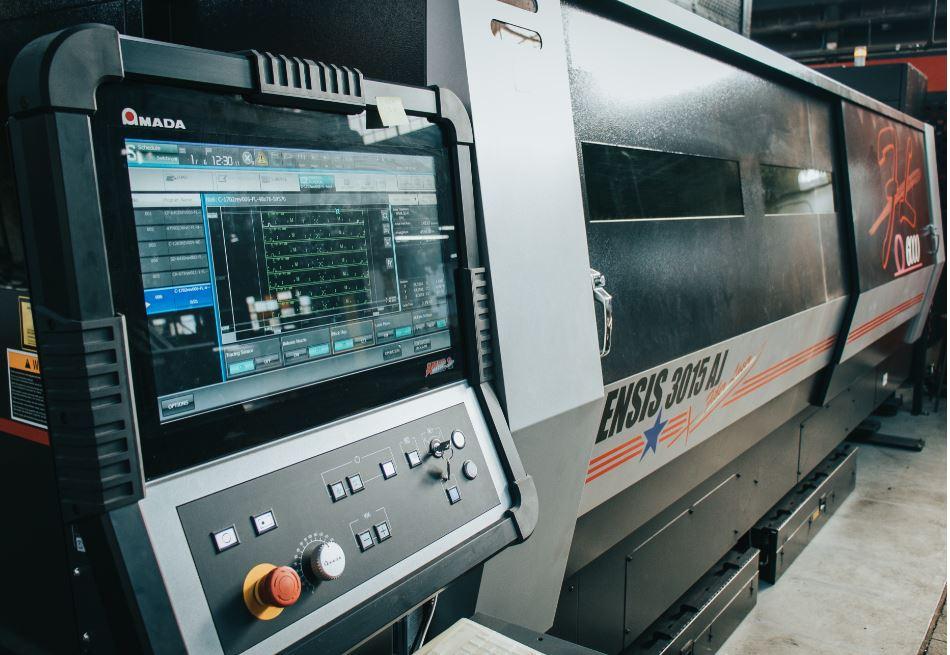
Laystrom Manufacturing’s new 6-kW Amada Ensis 3015 AJ fiber laser cutting machine is the newest addition to the company’s sheet metal cutting capabilities. It also has two 4-kW CO2 laser cutting machines from Amada.
“I don’t need to have an ego about being right about this. I can be in front of everybody, take the criticism publicly, and share with everybody that I’ve learned from this process,” Cosgrove said.
Character Counts
That sort of action from a leader shows that he’s bought into the initiative. Many a company project has died because management has failed to show support for it. In some companies, longtime workers know they can outlast any new initiative if top management is actively absent from update meetings or just simply ignores goals and expectations set up for others to follow.
With safety being a permanent backdrop against almost any company conversation, people understand that the company is trying to keep them and their co-workers free from injury. That directly ties into the core value of character, where employees are expected to treat themselves and co-workers with respect. If they value their co-workers’ contributions, they definitely want them to return tomorrow to be able to contribute again.
Cosgrove recalled an incident from about five years ago when a front-line worker, who had done something in an unsafe manner, admitted to his mistake in front of everyone during one of the huddles. Not one to be so outspoken, the individual copped to making the mistake and pledged not to do it again. Four months later, Cosgrove said a senior manager told him that she was moved by that employee’s open act of honesty and how her respect had grown for him. The bond between co-workers had grown stronger. With that trust, a lot can be accomplished.
Bob Laystrom, the chairman of the board and president of his family’s company from 1987 to 2015, thinks this type of organizational cohesiveness is a logical extension of the way the business has always been run. (The Laystrom family is actually one of seven family groups that work at the company.) The employees may not have had the last name of Laystrom, but they were looked upon as beloved and trusted colleagues.
“A tight family business is always going to have a certain amount of culture and loyalty to their employees. So from my standpoint, I see our current culture as an extension of what we’ve always been doing,” he said. “We never really had a huge amount of turnover. Our safety record was always good.
“We’re just spending more time making people in the company understand what is going on with the business,” Laystrom continued, “such as what it means to get orders out the door on time and how that relates to the press brake operator, or what it means to understand the quality aspect of things and why it’s important for the person running the laser to know that. It’s just driving that important information to everyone else in the organization.
“That works because you start to see people step up to the next level and past that to achieve things at a higher level.”
That was never really more evident than in 2020 when big plans collided with the global pandemic. Laystrom closed 2019 in the midst of divesting its stamping operations, installing its new fiber laser cutting machine with an accompanying material storage tower, and reorganizing a storage area. Even with the internal changes, the metal fabricator was able to take advantage of a robust start to 2020, enjoying a record month in March. Of course, then everything halted in April with the first lockdown, followed by a slow return to business almost as usual.
Cosgrove said that he had early discussions with his management team about the pandemic in late January. By the time the first large wave of coronavirus cases were being reported, Laystrom had taken steps to minimize its spread. Those that could work from home were allowed to. All in-person meetings were cancelled for months, and social distancing was practiced at the facility. Masks were mandatory. Laystrom fabricated its own foot pedals and installed them on doors so that employees didn’t have to use their hands to open doors. At the time experts suggested that the coronavirus could live on a surface for up to 72 hours, so the shop was shut down on Fridays, Saturdays, and Sundays, giving the facility a 72-hour window for the virus to become inactive.
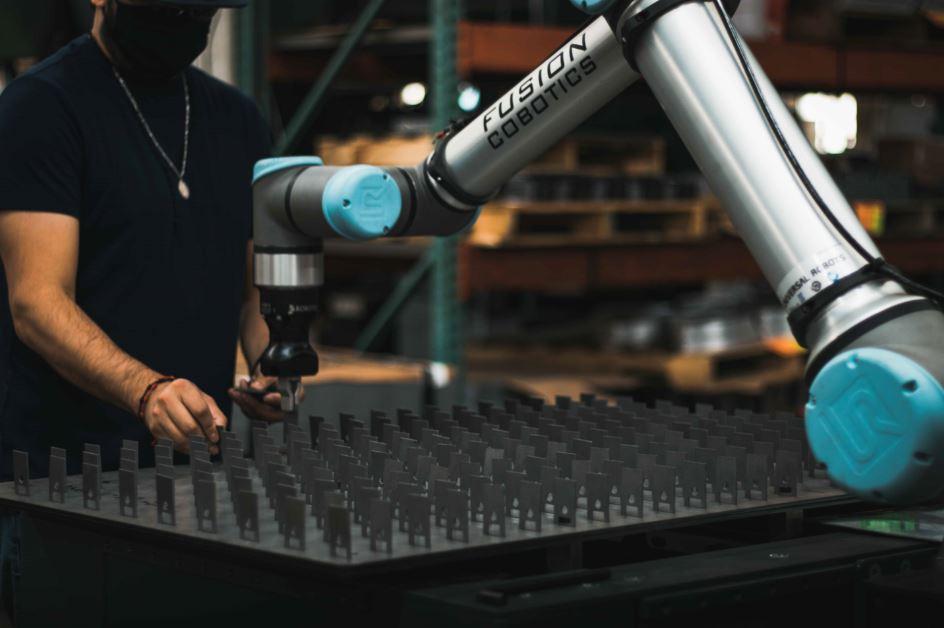
A new collaborative robot has been welcomed with open arms, according to company management. The company has used it in assembly and press brake applications and continues to see how it might be used elsewhere in the facility.
All the effort paid off for most of 2020. The company had only one reported COVID-19 case in the spring. (More cases were reported during the second wave in the fall, but Cosgrove said that the company still hasn’t suffered with large-scale absences. It’s been able to meet delivery and performance goals even without key personnel because of others stepping up.)
The Laystrom team also completed its own internal transformation. In particular, 21 presses and 150 skids of dies were moved out of the facility. (As late as 2019, stamping still represented about 10% of the company’s overall revenue, according to company management.) The fiber laser cutting machine and its automated material feed system is up and running. The shop floor looks like a new place. About 25,000 sq. ft. of the 70,000-sq.-ft. facility has been freed up and repurposed for future growth.
“Getting all that done at the same time the world’s coming down around your ears because of COVID-19, that’s amazing to me that it has worked out as well as it has,” Laystrom said. “It wouldn’t have happened unless the people were committed to make it work. I’m really proud of what they’ve done, and I’m happy to be a part of the team.”
Valuing the Connections
The pandemic revealed the company’s ability to get things done even as it took steps to deal with virus avoidance while staying on top of business, which rebounded by May. Customer commitments are always important, but management wasn’t going to put employees’ health at risk to make it happen. The connections to their co-workers were valued. If they needed time off to deal with sickness at home, which many did during this time, they were told to take care of the family situation first.
The importance of connections applies both inside and outside Laystrom’s facility, according to Cosgrove. Connections to customers help to elevate a relationship beyond the “what’s your best price” discussion. Connections to supply chain partners get a company more favorable delivery terms. The company is deeply committed to manufacturing advocacy with connection to Manufacturing Renaissance, a Chicago-based nonprofit organization that looks to address the wide-scale loss of jobs in the city; the local Manufacturing Careers Internship Program; and the Chicago Cook Workforce Innovation Board, where Cosgrove serves as a board member. Even connections with neighbors with whom Laystrom shares the street are important.
In 2019 the fabricator expanded the dock in front of the building for extra truck parking. This type of construction is a big deal because as work trucks arrive to make deliveries, they are jockeying for position with nearby residents’ own vehicles. That’s the nature of trying to run a manufacturing operation where a residential neighborhood is literally across the street.
The dock expansion was a good thing because it rerouted trucks off the residential street, opening it up for more street parking and improved traffic flow. The Laystrom team recognized the effort as an immediate improvement for the neighborhood. In fact, they were confident enough to take their plans to their neighbors and get their approval.
“We told them what we wanted to do and what we believed were the benefits of doing it. Then we asked them, ‘What do you think? Are you in agreement with this?’” Cosgrove said. “Every single neighbor was happy to sign the document.”
In a cynical but all too often justified view of Chicago, “connections” can suggest a not-so-legal relationship between a private citizen and a public official who can do favors for the citizen if the price is right. In this instance, the power of connections between neighbors trumped all.
Laystrom approached its alderman with its plans and received support. But guidance from staff suggested that the neighborhood wouldn’t put up with such a disruption. Laystrom’s document with 22 signatures from the neighbors said otherwise. Cosgrove said the plans got approved in five minutes.
The city of Chicago permit office got involved and raised similar objections. Cosgrove recalled a statement from one official: “We’ve seen this before and the community never wants to do this.” Again, Laystrom’s declaration of interdependence proved that supposed reality wasn’t necessarily the case. They got city approval for the project soon after that conversation.
“We need to have that connection to these people and talk about this environment we’re sharing. As a result, we didn’t have to bend anybody’s hand behind their back,” Cosgrove said. “Those core values can guide us in situations like this.”
Contributions From All Levels
Get the character part down, work to strengthen the connections, and then expect contributions at all levels of the organization. That’s when an organization really starts to hum.
“When we have somebody struggling, whether it be with a certain operation or something like that, our employees come together and come up with answers to help out,” said Jeff Dec, who has been plant manager for five years. “I’ve been doing this for 46 years, so I’ve been at this from a very young age. This is the first place that I’ve ever seen where people step up like they do here.
“It’s not ‘It wasn’t my fault’ or ‘I didn’t do it.’ It’s ‘I didn’t realize this was happening. Can you help?’” he continued. “So they come up with solutions to help.”
Esther Rosado, who holds the title of purchasing and supply chain specialist at Laystrom, found herself in the receiving department for several days in October. Some workers in that department caught the coronavirus during the second surge and, as a result, the department was short-handed. Rosado said she saw an opportunity to help and jumped right into the fray.
“Because I had been involved with supplier reviews, I had dealt with all of the receiving forms. I knew what they were supposed to look like and what information was needed,” Rosado said. “I could take what I knew and integrate it with the skills I use to expedite things.”
That led to some long days, Rosado said, but she learned a lot about that company function and about other co-workers that she was able to work with more closely. Those people working near the receiving area were actually able to help her out on several occasions, telling her where she could find part locations.
“I have so much respect for my co-workers and what they handle each day,” she said.
Cosgrove said that those types of interactions are sometimes planned as well. While a conversation about a part that has one bend and requires two weld nuts might not be a cause for a meeting of the engineering, manufacturing, and quality departments, an assembly with 14 components might require a new product introduction meeting of the team to figure out the best way to fabricate it. In those instances, the group might pull in someone from customer service or purchasing because they are able to offer an intelligent opinion from a point of view outside of the technical group. That input might have to do with how the customer likes to receive deliveries or some other key client intelligence that can influence the overall project.
“Leveraging people’s skills across different boundaries is super important,” Cosgrove said.
Cultivating the Knowledge
Laystrom is like other metal fabricators in the sense that no one is walking in off the street and asking about a career in running a press brake. Finding the right fit for openings is not easy.
With that in mind, when the metal fabricator finds someone who is genuinely interested in learning about metal fabricating and shows a talent for some aspect of it, they’ll provide them an environment to do just that. Rosado said that is one of her favorite things about the company. She is currently working on a supply chain management certificate and ultimately would like to add Six Sigma certification to her resume as well.
Many fabricating companies talk a good game about training and skills development, but it’s easy to fall short in actually supporting those statements. Training takes people away from production, so some companies refrain from too much of it. Also, some fabricators lack formalized career paths and skill attainment programs, which stifles employee skill development. Other companies are just scared to invest in training of employees because they are afraid those newly skilled workers will leave for the slightest pay raise or new opportunity.
A metal fabricator that is dedicated to this type of employee development is a confident one. This type of shop is more interested in the potential of what can be accomplished with investment in the growth of personnel, not with what might happen if employees leave. It’s important enough that Cosgrove worked it into the core value of cultivation, or as it is formally defined in the purpose statement: “We cultivate our skills, thoughts, knowledge, and apply those learnings to promote personal and professional advancement.”
Dec said that Laystrom tracks skill development for all of its employees. For each function on the shop floor, employees are tabbed as inexperienced (No. 1), semi-experienced (No. 2), very experienced (No. 3), and very experienced with the ability to train others (No. 4).
“This is actually part of the supervisors’ reviews, which take place on a quarterly basis. That’s the supervisors’ incentive to make sure the training is done accurately, even if they have to delegate it,” Dec said.
This knowledge sharing isn’t limited to technical topics. Laystrom even started a book club for the company at the beginning of 2020. The first book was The 7 Habits of Highly Effective People.
“In the first three weeks of conversations we had around that book, people were really responsive to it,” Cosgrove said. “That’s the growth of the individual in terms of who they are as people.”
Growth Provides Opportunity
When everyone is making the right choices, working hard to support their co-workers and customers, and coming up with creative and intelligent solutions to the problems they face every day, Laystrom is competitive with the shop down the street or the one sitting in a cornfield near some small Midwestern town. What does that competitiveness look like? Both Cosgrove and Dec each recalled one particular rush job from the summer.

Last year was transformative for Laystrom Manufacturing as it divested its metal stamping equipment and installed new fiber laser cutting technology.
Cosgrove was on a family vacation in Wisconsin when he got a call from a new customer, a referral actually, asking about the possibility of expediting a big job. Cosgrove said he made one phone call to his team, letting them know of the opportunity and that was the extent of his contributions.
“From there on, it was everyone else,” he said.
Dec said the purchase order came over on a Thursday night, material was delivered on Friday afternoon, and 1,700 pieces were sitting on the shipping dock on Monday morning waiting to go out for paint.
“Everybody stepped up and did their jobs, and when they had the chance, they’d help others with their jobs. There was no one complaining or saying that it wasn’t their job,” Dec said.
The responsiveness didn’t stop there for this new client. Laystrom was able to deliver another 4,000 parts over the following four weeks to the same customer.
Dec pointed out that it’s not all hustle and employee buy-in that generate topnotch customer service and resulting loyalty. Technology plays a part. Each laser cutting machine is supported by automated material feed systems, and the networked press brakes all have offline-stored programs at their disposal and quality documentation nearby. Laystrom has even purchased a Universal Robots collaborative robot to sit in front of an older press brake to tackle some longer and more tedious jobs.
Dec said that Laystrom had looked at other jobs that the cobot might do. One day he walked up to a woman running a multihead tapping machine and asked her if she liked working on that piece of equipment. She replied that she hated it because it was boring.
“I told her that the cobot could probably do that job, and she said, ‘That’s great. How can I help?’” Dec recalled. “People in other companies might have responded, ‘Hey! I don’t want it to take over too much.’”
Laystrom’s company culture even makes the cobot feel welcomed.
Editor's note: Read more about how we recently revisited previous winners of The FABRICATOR's Industry Award: Seconn Fabrication, Shickel Corp., GenMet Corp., DeWys Manufacturing, A&E Custom Mfg., and, of course 2020 winner Dalsin Industries.
About the Author

Dan Davis
2135 Point Blvd.
Elgin, IL 60123
815-227-8281
Dan Davis is editor-in-chief of The Fabricator, the industry's most widely circulated metal fabricating magazine, and its sister publications, The Tube & Pipe Journal and The Welder. He has been with the publications since April 2002.
Related Companies
subscribe now

The Fabricator is North America's leading magazine for the metal forming and fabricating industry. The magazine delivers the news, technical articles, and case histories that enable fabricators to do their jobs more efficiently. The Fabricator has served the industry since 1970.
start your free subscription- Stay connected from anywhere

Easily access valuable industry resources now with full access to the digital edition of The Fabricator.

Easily access valuable industry resources now with full access to the digital edition of The Welder.

Easily access valuable industry resources now with full access to the digital edition of The Tube and Pipe Journal.
- Podcasting
- Podcast:
- The Fabricator Podcast
- Published:
- 04/16/2024
- Running Time:
- 63:29
In this episode of The Fabricator Podcast, Caleb Chamberlain, co-founder and CEO of OSH Cut, discusses his company’s...
- Industry Events
16th Annual Safety Conference
- April 30 - May 1, 2024
- Elgin,
Pipe and Tube Conference
- May 21 - 22, 2024
- Omaha, NE
World-Class Roll Forming Workshop
- June 5 - 6, 2024
- Louisville, KY
Advanced Laser Application Workshop
- June 25 - 27, 2024
- Novi, MI



